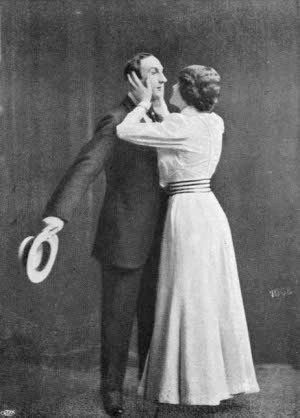If one is looking for romantic love in drama, perhaps Shaw's plays are not the best place to look for it. In fact, Shaw seems to have a personal definition of love that does not fit most people's idea of it - to the extent that we can find quite a few examples in which Shaw refers to this human feeling as "what people call love." Let us look into a few of these, beginning with the plays and prefaces:
In the preface to Getting Married (I guess it was to be expected), Shaw starts off by taking a completely unconventional stance on love and its social implications:
"It would be far better for everyone,
as well as far honester, if young people were taught that what they call love
is an appetite which, like all other appetites, is destroyed for the moment by
its gratification; that no profession, promise, or proposal made under its
influence should bind anybody; and that its great natural purpose so completely
transcends the personal interests of any individual or even of any ten
generations of individuals that it should be held to be an act of prostitution
and even a sort of blasphemy to attempt to turn it to account by exacting a
personal return for its gratification, whether by process of law or not."
This notion that love is beyond our understanding can be complemented by Secondborn's words in Buoyant Billions, where in addition we are told that love is not as universally human as we may think:
SECONDBORN. La Rochefoucauld told you two centuries ago that though the appetite we call
love is in everybody's mouth very few have ever experienced it. God is not
Love: Love is not Enough: the appetite for more truth, more knowledge, for
measurement and precision, is far more universal: even the dullest fools have
some glimmer of it.
After all, as King Charles puts it, what others call love is nothing but a burdensome habit that one ends up growing over.
CHARLES. Do you suppose I have learnt nothing about women and what you call love in that time? You still have love affairs: I have none. However, I am not reproaching you: I am congratulating you on being still young and green enough to come all the way from Holland for a night in London.
By the way, you might want to have a look at the study guide for Good King Charles created by the Shaw Festival, although this particular play did not get the type of reviews one would have expected.
Some of these views on love found their way into Shaw's personal correspondence, as one can gauge from the following two excerpts. The first, from a letter to Ellen Terry dated Nov. 1900, tells us a great deal about the playwright's perception of what love means.
"I know what it is to be loved. Good Heavens! You are a thousand times right to keep me out of reach of your petticoats: what people call love is impossible except as a joke (and even then one of the two is sure to turn serious) between two strangers meeting accidentally at an inn or in a forest path. Why, I dare not for my life’s happiness make love to my own wife. A delusion, Ellen, all this love romance: that way madness lies."
The second, in turn, (from a letter to Henri Logeman dated Aug. 1923) provides the intersection between love in Shaw's private life and the way he presented it in his plays. Again, very telling.
"In Methuselah it is assumed that what we call love is a childish crudity, and that the most enduring and enthralling passion is intellectual passion. That is no doubt very puzzling, and even revolting and dismaying, to people who have no intellectual interests, and get through life on their appetites; but it should present no difficulty to any serious critic."
As is usually the case with Shaw, we are left pondering what the real Life Force is.








